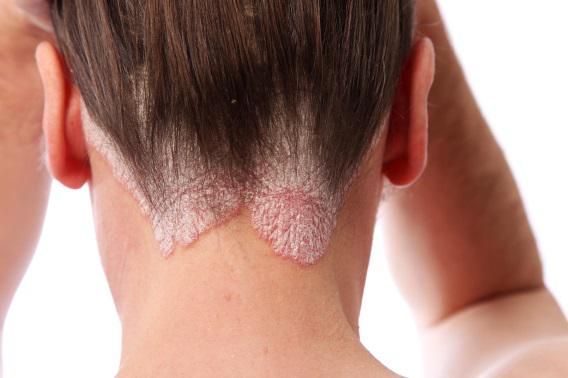Psoriasis isn’t contagious, but awareness is.
Psoriasis is a condition that causes the body to produce new skin cells faster than usual. This causes thickening, scaling, and redness of the skin, along with severe itching. The condition affects around 2% of the total population in the United States and can occur at any age and any skin type.
Psoriasis can appear anywhere on the body and in the majority of cases appears as thick, scaly patches called plaques. Most often they occur on the scalp, back, knees and elbows. There are different types of psoriasis and symptoms may differ based on which specific type a patient has. For instance, someone with guttate psoriasis may see numerous small, circular, thin red plaques all over their body, while someone with inverse psoriasis may experience areas of smooth, red, raw-looking patches of skin that can be sore or painful. There are two very serious, rare forms – pustular and erythrodermic. These can affect the entire body and sometimes even be life-threatening.
Typically 80-90% of patients experience the non-life threatening plaque type of psoriasis, which is characterized by those thick, red, scaly plaques on the surface of the skin.
Is it contagious?
Psoriasis is not contagious and you cannot ‘catch’ it from someone who has it. Even though we know this skin condition does not spread from person to person, researchers are still looking for the direct cause of why and how it develops. We do know the condition tends to run in families and shows a genetic link. There is also a proven immune link.
There are many triggers for flare-ups including viral illness or infections, weather changes, stress or injury. An important part of treating and controlling psoriasis is helping the patient to understand and recognize what triggers their symptoms.
The most common symptoms occur on the skin as plaques and rashes. However, nail changes and joint swelling or pain can also indicate psoriasis. Once diagnosed, many times the condition can be treated and controlled with topical creams. The treatments will always vary on the type, location, and severity of the disease. Light therapy is sufficient for many patients. In some cases, oral or injectable medicines will control the condition.
While psoriasis is not curable, it is treatable and there are many options available. Patients are largely able to control their symptoms and go on to have healthy, comfortable, and clear looking skin.
Don’t struggle with untreated psoriasis, contact us to schedule your treatment appointment today.

